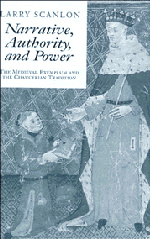Book contents
- Frontmatter
- Contents
- Acknowledgments
- INTRODUCTION: EXEMPLARITY AND AUTHORITY IN THE MIDDLE AGES
- PART 1 THE LATIN TRADITION
- PART 2 THE CHAUCERIAN TRADITION
- 6 Exemplarity and the Chaucerian tradition
- 7 Canterbury Tales (I): from preacher to prince
- 8 Canterbury Tales (II): from preaching to poetry
- 9 Bad examples: Gower's Confessio Amantis
- 10 The Chaucerian tradition in the fifteenth century
- Bibliography
- Index
6 - Exemplarity and the Chaucerian tradition
Published online by Cambridge University Press: 16 September 2009
- Frontmatter
- Contents
- Acknowledgments
- INTRODUCTION: EXEMPLARITY AND AUTHORITY IN THE MIDDLE AGES
- PART 1 THE LATIN TRADITION
- PART 2 THE CHAUCERIAN TRADITION
- 6 Exemplarity and the Chaucerian tradition
- 7 Canterbury Tales (I): from preacher to prince
- 8 Canterbury Tales (II): from preaching to poetry
- 9 Bad examples: Gower's Confessio Amantis
- 10 The Chaucerian tradition in the fifteenth century
- Bibliography
- Index
Summary
The exemplum was the dominant narrative genre of the Chaucerian tradition. Of its four most important works, the Canterbury Tales, the Confessio Amantis, the Regement of Princes, and the Fall of Princes, only the first is not an exemplum collection. Even that, however, is a collection of narratives which the exemplum, and the issue of exemplarity, pervades at every level. Of its twenty-four tales, at least eight and as many as twelve can be described as exempla or exemplum collections. The accretion of exempla within tales – Dorigen's lamentation is one spectactular instance, Chauntecleer's defense of dreams another – is one of Chaucer's favorite rhetorical ploys. Even the tales that are not exempla in a strict generic sense, that is, the romances and the fabliaux, tend to end with moralizing explicits. The prologues return repeatedly to the opposition between moral ernest and narrative game, and the estates-satire frame implicitly makes each tale an exemplification of the social position of the character who speaks it.
In my examination of the Latin tradition I have argued that the sermon exemplum and the public exemplum formed distinct yet complementary vehicles of the Church's broad-based attempts to increase its institutional control of secular life. I will now argue that the Chaucerian tradition's dependence on the exemplum represents an appropriation, or reappropriation of the ideological authority the Church used the exemplum to promote. The Chaucerian tradition used the exemplum as the vehicle to establish its own authority.
- Type
- Chapter
- Information
- Narrative, Authority and PowerThe Medieval Exemplum and the Chaucerian Tradition, pp. 137 - 145Publisher: Cambridge University PressPrint publication year: 1994



